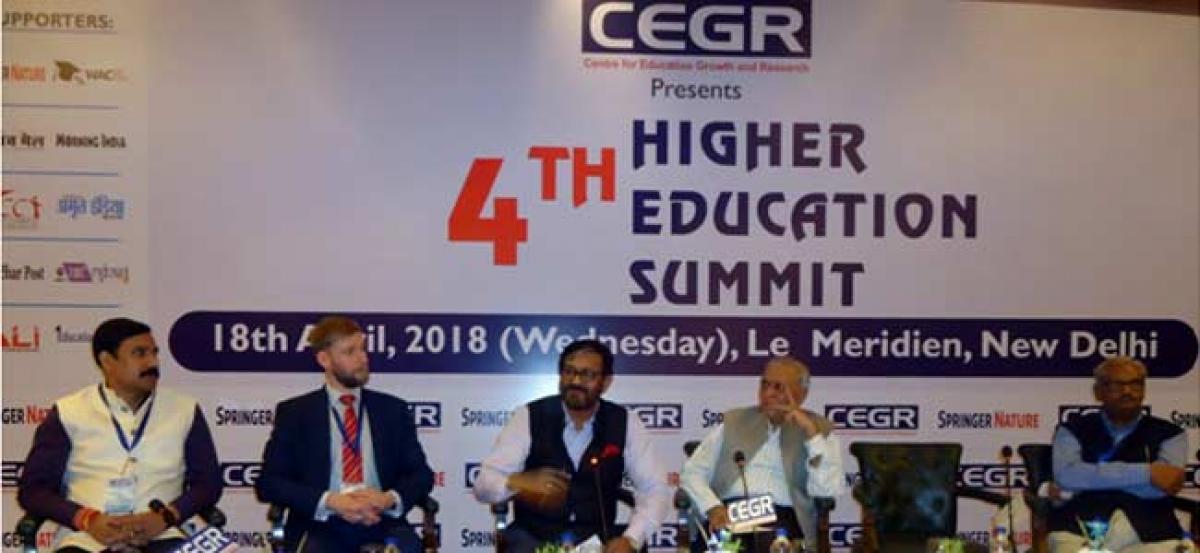Live
- NASA Tracks Five Giant Asteroids on Close Approach to Earth Today
- Pushpa 2 Hits ₹1000 Crore in 6 Days: How It Compares to Other Top Indian Films
- Vivo X200 and X200 Pro Launched in India: Price, Specifications, and Features
- Nitin Gadkari Admits Feeling Embarrassed at Global Summits Over Rising Road Accidents in India
- Comprehensive Review on Indiramma Housing Survey and Welfare Initiatives Conducted via Video Conference
- Jogulamba Temple Records Rs 1.06 Crore Hundi Revenue in 150 Days
- Opposition Slams ‘One Nation, One Election’ Bill as Anti-Democratic; BJP Allies Support the Move
- Celebrate Karthigai Maha Deepam Virtually with Sri Mandir’s LIVE Darshan Experience
- BJP Extends Support to Samagra Shiksha Abhiyan Employees' Strike, Demands Immediate Regularization and Welfare Benefits
- Dr. M. Priyanka Stresses Quality Education, Nutritious Meals, and Cleanliness in Schools
Just In
It is not about private vs. government institutes, anymore. AICTE Director at CEGR conference


Talking on the present and contemporary challenges during the 4th Higher Education Summit organized by CEGR, Dr. Manpreet Singh Manna, Director, AICTE said, it is no more about private colleges vs. government colleges and there is no discrimination between a private and a government institute.
Talking on the present and contemporary challenges during the 4th Higher Education Summit organized by CEGR, Dr. Manpreet Singh Manna, Director, AICTE said, it is no more about private colleges vs. government colleges and there is no discrimination between a private and a government institute. AICTE is now pro-actively working towards developing overall quality of education being offered and is more a facilitator than a regulator. Prof. Rajive Kumar, Adviser - Policy and Academic, AICTE, sharing similar sentiments earlier during his speech, said that reforms were being planned in examinations patterns with focus on learning outcomes.
Edupreneurs, academicians, policymakers, corporate and publishers of scientific journals and research papers were seen fraternizing, exchanging and deliberating on burning topics at the 4th Higher Education Summit organized by CEGR on 18th April 2018 at the Le Meridian Hotel, New Delhi.
Speaking on the topic of ‘India becoming a research hub’, Dr. Jitendra K Das, Director, FORE School of Management, New Delhi raised pertinent questions towards selection process of institutions by the HRD Ministry for funding and the freedom in terms of functionality, granted to them. Taking a dig at the ecosystem of research studies in India, Dr. Das referred to a popular movie of 90s, ‘Ek Doctor Ki Maut’ which depicted the cultural assumptions and social realities around scientific research in India and the bureaucratic negligence of a doctor and his research. Mentioning a satirical take by Jaspal Bhatti on how a research fellow who had to be more loyal to his guide than his subject, Dr. Das condemned the practice of PhD supervisors who are often seen accepting a plagiarized thesis paper or approving the dissertation submitted by the research fellow, without taking any interest in reading it.
Echoing similar sentiments about the plight of research scholars of the nation, Dr. S. S. Agarwal, Director General KIIT Group of institutions, raised a thought provoking question, as to why India do not have a single Noble Laureate for the past 70 years, ever since Dr. C.V. Raman received the Noble Award in 1930.
Chief Mentor of Rukmini Devi Group of Institutions, Dr. Raman Garg, who completed his PhD from the University of Manchester with scholarship grant had a different take on the research fund allocation system and suggested that research grants should be given to scholarly students genuinely interested in research rather than allocating it to institutes.
Mr. Anant Soni, Chancellor, AKS University during his address urged institutes to be independent and take self-sustainable initiatives. Responding to a remark by Director AICTE, he said private institutes can become benchmarks of excellence if soft loan schemes be made available to private institutions by the Government as an alternative to fund allocations.
Deliberating on private-government-partnership towards offering quality education Dr. V.M. Bansal, Chairman, New Delhi Institute of Management, referred to initiatives like the Smart India Hackathon and Indo-Japan Technical Intern Training Programme where NDIM partners Indira Gandhi Computer Shaksharta Mission students exchange programs.
Prof. N K Sinha, President, Himalayan Garhwal University pointed out the scarcity of quality faculties, recommended a selection and training process akin to the National Eligibility Test also known as UGC NET, through which skilled faculties can be allocated to private universities and colleges.
Centre for Education Growth and Research (CEGR) an independent think tank, with Ravish Ranjan, the Director and at the helm of affairs, could manage to successfully bring in the stake holders in the platform and generate a framework for the policymakers to ponder upon. Among the 200 delegates and speakers also present were Sushma Sahu Member of National Commission for Women; Shazia Ilmi, Vice President, BJP Delhi Pradesh; Kamal Singh, Executive Director, United Nation Global compact; A. P. Mittal, Member Secretary, AICTE; K. K. Aggarwal, Chancellor, K. R. Mangalam University; Kunwar Shekhar Vijendra, Chancellor, Shobhit University; Shiv Kumar Gupta, Chancellor, Himalayan Garhwal University; Devendra Pathak, Vice Chancellor, Sanskriti University; Nils Moeller, Director and Sanjiv Goswami, MD Springer India Private Ltd.

© 2024 Hyderabad Media House Limited/The Hans India. All rights reserved. Powered by hocalwire.com






